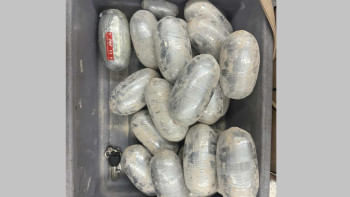Dhaka, Delhi to up anti-terror cooperation
Bangladesh and India yesterday pledged to enhance bilateral cooperation to counter terrorism by agreeing to immediately operationalise the agreement on combating terror and organised crime and illicit drug trafficking.
A Memorandum of Understanding (MoU) was also signed between the two countries to amend the extradition treaty to make it more effective.
The decisions were taken in a delegation-level meeting of the home ministers of the two countries -- Asaduzzaman Khan Kamal of Bangladesh and Rajnath Singh of India -- at the Indian home ministry here in the afternoon.
Emerging from the about 90-minute meeting, Kamal told journalists that there would be greater cooperation between Bangladesh and India in anti-terrorism measures.
“India has promised that it will stand by Bangladesh in the fight against terror,” he said.
Kamal said the two countries inked a MoU approving an addendum to the bilateral extradition treaty which will make the pact easier for both sides.
Before the home minister-level talks, Kamal called on Indian Prime Minister Narendra Modi yesterday morning and discussed bilateral issues and the current situation in Bangladesh.
UNB adds: Modi reaffirmed that India is with Bangladesh in its fight against terrorism as it did during the Liberation War in 1971.
The Indian premier came up with the assurance when Kamal met him on the 2nd day of the 5th India-Bangladesh Home Ministerial meeting in India, said a home ministry release.
Kamal thanked Modi on behalf of Prime Minister Sheikh Hasina for India's support to Bangladesh in its fight against terrorism.
According to clause 10/3 of the extradition treaty, evidence alongside the warrant of arrest was needed to extradite such persons.
As per the amended proposal, extradition of the convicted and under-trial criminals will be possible if a court in any of the countries issues an arrest warrant for them.
Bangladesh cabinet approved the amendment on July 18. The extradition treaty between the two countries will take effect on October 23, 2016.
An official statement issued after yesterday's meeting said the MoU on an addendum to the bilateral extradition treaty was aimed at “further streamlining the treaty and making it more effective.”
The two countries also agreed on the necessity of signing a repatriation treaty to simplify and expedite the procedure of repatriation of each other's nationals. Both sides also agreed to undertake an urgent action for the repatriation of released prisoners and victims of human trafficking, the statement said.
During yesterday's talks, Bangladesh and India recalled Prime Minister of Bangladesh Sheikh Hasina's address in the wake of terrorist attacks in that country “emphasizing the need to be united in the fight against terrorism and to be vigilant against the nefarious designs of destabilising elements in society”.
The meeting appreciated various counter-terrorism measures undertaken by the Bangladesh government to fight extremist and radical elements, said the statement.
The two sides consented to further strengthen the ongoing cooperation between the security and investigative agencies of the two countries through a programme of training, capacity-building, information exchanges, etc, it added.
Rajnath Singh condemned the horrific terrorist attacks in Dhaka in July, 2016, and assured Bangladesh of India's fullest support and cooperation in its fight against terrorism, fundamentalism and radicalism.
He said the two countries have to be vigilant at all times and channelize efforts to defeat terrorism and ensure peace, security and prosperity between the two countries.
Recalling the historic visit by Indian Prime Minister Narendra Modi to Bangladesh in June 2015, the two home ministers agreed that the visit had “infused a new dynamism in bilateral relations, widening the avenues for cooperation between the two countries”.
India and Bangladesh also emphasised the need for speedy operationalisation of three bilateral MoUs: MoU between Indian Coast Guard and Bangladesh Coast Guard for Establishment of Collaborative Relationship to Combat Transnational Illegal Activities at Sea and Develop Regional Cooperation, MoU to Prevent and Counter Smuggling and Circulation of Fake Currency Notes, and MoU on Bilateral Cooperation for Prevention of Human Trafficking, especially trafficking of women and children; rescue, recovery, repatriation and reintegration of victims of trafficking, signed during the visit of Modi.
Both sides emphasised the importance of effective implementation of the Coordinated Border Management Plan to enhance cooperation between the border guarding forces of the two countries.

 For all latest news, follow The Daily Star's Google News channel.
For all latest news, follow The Daily Star's Google News channel. 



Comments